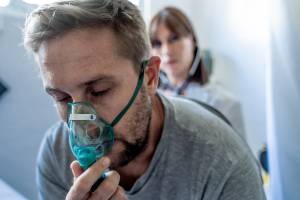Blog
How Does Shortness of Breath Affect Someone with Mesothelioma?
Posted on behalf of Peter T. Nicholl in Mesothelioma & Asbestos Published on July 16, 2021 and updated on March 15, 2022. Shortness of breath is one of the most common symptoms of mesothelioma that can occur in the early stages of the disease. As the disease progresses, shortness of breath may become more severe due to increased fluid buildup, tissue thickening and tumor growth.
Shortness of breath is one of the most common symptoms of mesothelioma that can occur in the early stages of the disease. As the disease progresses, shortness of breath may become more severe due to increased fluid buildup, tissue thickening and tumor growth.
Having shortness of breath, however, is not usually enough for doctors to confirm a mesothelioma diagnosis. Chest pain or a chronic dry cough – a combination of symptoms – could be a sign of mesothelioma, particularly pleural mesothelioma, which affects the lining of the lungs.
Our mesothelioma lawyers in Maryland are ready to review your claim if your shortness of breath has led to being diagnosed with mesothelioma. We know what it takes to seek maximum compensation to help cover medical costs and other related damages. The initial consultation is free of charge.
Find out if you have a case. Ph: 410-297-0343.
What is Shortness of Breath?
Shortness of breath or dyspnea is an uncomfortable condition that makes it difficult to fully get air into the lungs. It can be harder to inhale or exhale, leaving mesothelioma patients feeling winded.
The onset of the condition is often accompanied by a tight sensation in the chest, feeling like you need to breathe more or more quickly, and/or feeling like your body cannot get enough oxygen fast enough.
Shortness of breath is a common early symptom of mesothelioma. However, it is also a symptom of many other illnesses, such as chronic obstructive pulmonary disease (COPD).
If you have a history of asbestos exposure and are experiencing shortness of breath that continues to get progressively worse, it is important to see a doctor as soon as possible. Many mesothelioma patients experience shortness of breath or difficulty breathing over a period of time before they are diagnosed.
Causes of Shortness of Breath in Mesothelioma Patients
Shortness of breath in mesothelioma patients can be caused by several different factors.
Fluid Buildup
Mesothelioma can cause a buildup of fluid up in and around the lungs. This can put pressure on the lungs and not allow the lungs to expand properly. The result is shortness of breath.
For patients with pericardial mesothelioma, the fluid can build up around the lining of the heart. This can cause irregular heartbeats, reduced blood flow and low oxygen levels, resulting in breathing issues.
Tissue Thickening
When scar tissue thickens the lining of the lungs in patients with mesothelioma, it makes it more difficult for the lungs to expand easily and painlessly. This can make it increasingly harder to breathe.
Pain
Pain can limit how deep someone is able to breathe. The cancerous tumors can push against the tissues in the lungs and chest, making it difficult to take full breaths.
Tumor growth can also put pressure on pleural pain receptors. With each breath, the pleural tissue that covers the lungs and lines the interior wall of the chest cavity stretches and moves. When this movement is restricted by pain, shortness of breath can happen.
Treatments Available for Shortness of Breath
Treatment for mesothelioma may sometimes cause or worsen shortness of breath for a brief time. This can happen when surgery is required to remove significant tissue from the chest cavity.
Shortness of breath can have a significant impact on a patient’s quality of life, but there are treatments available to help improve breathing. These treatments include:
- Pleurodesis – This procedure adheres the lung to the chest wall. The space between the outer lining of the lung and chest wall is removed to prevent fluid buildup in and around the lungs.
- Thoracentesis – This surgical procedure removes fluid from the chest cavity to relieve pleural effusion (fluid buildup between the tissues that line the lungs and the chest).
Ways to Help Manage Shortness of Breath
If you are struggling with shortness of breath, speak with your doctor. There are things that can be done at home to provide some relief, especially for mesothelioma patients who cannot undergo surgery.
- Use a fan – Aiming a fan toward your face can help reduce feelings of breathlessness. Studies have found it to be just as effective as oxygen therapy.
- Try a relaxation technique – Shortness of breath can cause anxiety and stress. Meditation, yoga or any other activity that relaxes and eases stress is recommended to relieve breathing issues.
- Do breathing exercises – Your doctor can help you manage your breathing better with breath control training exercises. It can help open your airways, so breathing is more comfortable.
Call Today to Discuss Your Legal Options
If you or a loved one are experiencing shortness of breath and have since been diagnosed with mesothelioma, our lawyers at Peter T. Nicholl Law Offices are here to offer legal assistance.
For more than three decades, our firm has advocated for victims of asbestos exposure and their families to help them obtain the compensation needed to cover medical expenses and other related damages.
A consultation comes at no cost or obligation to you. If you have a valid claim, we charge nothing up front to represent you and no fees while we work on your case.
We are here to answer your legal questions. Call 410-907-3957.

